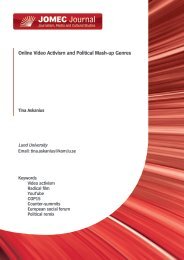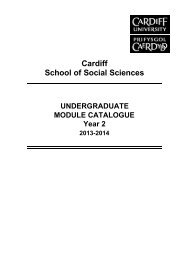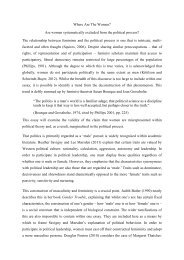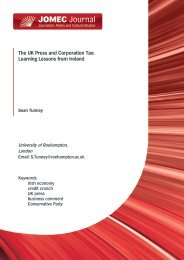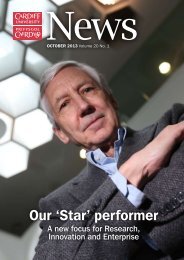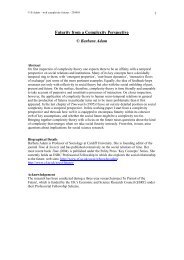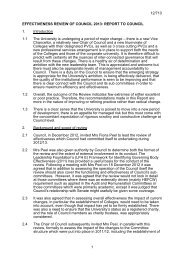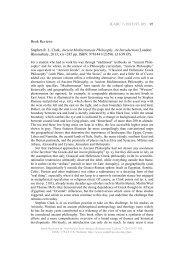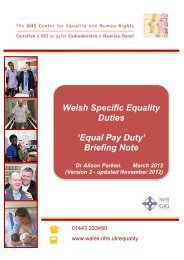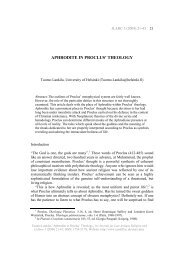Public Perceptions of Climate Change and ... - Cardiff University
Public Perceptions of Climate Change and ... - Cardiff University
Public Perceptions of Climate Change and ... - Cardiff University
You also want an ePaper? Increase the reach of your titles
YUMPU automatically turns print PDFs into web optimized ePapers that Google loves.
WSA Working Paper Series ISSN 2050-8522<br />
<strong>Public</strong> <strong>Perceptions</strong> <strong>of</strong> <strong>Climate</strong> <strong>Change</strong> <strong>and</strong> Energy<br />
Futures Before <strong>and</strong> After the Fukushima Accident: A<br />
Comparison between Britain <strong>and</strong> Japan<br />
Wouter Poortinga <strong>and</strong> Midori Aoyagi<br />
WSA Working Paper 01-2013
First published in January 2013 by the Welsh School <strong>of</strong> Architecture<br />
Welsh School <strong>of</strong> Architecture, <strong>Cardiff</strong> <strong>University</strong><br />
Bute Building, King Edward VII Avenue<br />
<strong>Cardiff</strong> CF10 3NB, Wales, United Kingdom<br />
Tel: +44 (0)29 2087 6097<br />
Fax: +44 (0)29 2097 4623<br />
Email: PoortingaW@cardiff.ac.uk<br />
Web: http://www.cardiff.ac.uk/archi/working_papers.php<br />
WSA Working Paper Series ISSN 2050-8522<br />
Paper Number: 01-2013<br />
<strong>Public</strong> <strong>Perceptions</strong> <strong>of</strong> <strong>Climate</strong> <strong>Change</strong> <strong>and</strong> Energy Futures Before <strong>and</strong> After the<br />
Fukushima Accident: A Comparison between Britain <strong>and</strong> Japan<br />
Wouter Poortinga <strong>and</strong> Midori Aoyagi<br />
Email: PoortingaW@cardiff.ac.uk<br />
Disclaimer<br />
All opinions expressed in this working paper are those <strong>of</strong> the author(s) alone <strong>and</strong> should not<br />
be regarded as the views <strong>of</strong> the Welsh School <strong>of</strong> Architecture or <strong>of</strong> <strong>Cardiff</strong> <strong>University</strong>. The<br />
copyright is retained by the author(s).<br />
2
Contents<br />
Contents ............................................................................................................................... 3<br />
Abstract................................................................................................................................. 4<br />
Acknowledgments ................................................................................................................. 4<br />
Introduction ........................................................................................................................... 5<br />
Background ....................................................................................................................... 5<br />
The Research .................................................................................................................... 8<br />
Results ................................................................................................................................ 10<br />
<strong>Public</strong> <strong>Perceptions</strong> <strong>of</strong> <strong>Climate</strong> <strong>Change</strong>............................................................................. 10<br />
Attitudes to Different Forms <strong>of</strong> Electricity Generation ....................................................... 11<br />
Attitudes to Nuclear Power .............................................................................................. 13<br />
Main Findings <strong>and</strong> Conclusions .......................................................................................... 19<br />
References ......................................................................................................................... 23<br />
Appendix ............................................................................................................................. 27<br />
3
Abstract<br />
The threats posed by climate change call for strong action from the international community<br />
to limit carbon emissions. Before the Fukushima accident that followed the earthquake <strong>and</strong><br />
tsunami on 11 March 2011, both Britain <strong>and</strong> Japan were considering an ambitious expansion<br />
<strong>of</strong> nuclear power as part <strong>of</strong> their strategy to reduce carbon emissions. However, the accident<br />
may have thrown nuclear as a publicly acceptable energy technology into doubt. This study<br />
uses several nationally representative surveys from before <strong>and</strong> after the Fukushima accident<br />
to examine how it may have changed public perceptions <strong>of</strong> climate change <strong>and</strong> energy<br />
futures in Britain <strong>and</strong> Japan. The study found that already before the accident the Japanese<br />
public were less supportive <strong>of</strong> nuclear power than the British. Whereas British attitudes have<br />
remained remarkably stable over time, the Japanese public appear to have lost complete<br />
trust in nuclear safety <strong>and</strong> regulation, <strong>and</strong> have become less accepting <strong>of</strong> nuclear power,<br />
even if it would contribute to climate change mitigation or energy security. In Japan the<br />
public are now less likely to think that any specific energy source will contribute to a reliable<br />
<strong>and</strong> secure supply <strong>of</strong> energy. The implications for energy policy are discussed.<br />
Key Words: Fukushima; <strong>Public</strong> <strong>Perceptions</strong>; Nuclear Power; <strong>Climate</strong> <strong>Change</strong>; Cross-<br />
Cultural Comparison<br />
Acknowledgments<br />
This research was conducted as part <strong>of</strong> the FY2012 Japan Society for the Promotion <strong>of</strong><br />
Science (JSPS) Invitation Fellowship for Research in Japan (Short-Term). We would like to<br />
thank the JSPS for their generous support (S-12008). We also would like to thank Pr<strong>of</strong>essor<br />
Nick Pidgeon, who led the Leverhulme Trust (RSK990021 <strong>and</strong> F/00 407/AG) <strong>and</strong> ESRC<br />
(RES-152-25-1011 <strong>and</strong> RES-062-23-113) funded projects on “<strong>Public</strong> Risk <strong>Perceptions</strong>,<br />
<strong>Climate</strong> <strong>Change</strong> <strong>and</strong> Reframing <strong>of</strong> UK Energy Policy” <strong>and</strong> “<strong>Public</strong> <strong>Perceptions</strong> <strong>of</strong> <strong>Climate</strong><br />
<strong>Change</strong> <strong>and</strong> Energy Choices in Britain”, as well as the British Science Association (BSA) for<br />
repeating some <strong>of</strong> the items in 2011. There were many others who have made the research<br />
in Japan <strong>and</strong> the UK possible. We are grateful for their involvement <strong>and</strong> contributions.<br />
4
Introduction<br />
Background<br />
<strong>Climate</strong> change is arguably the greatest challenge the world is currently facing. The threats<br />
posed by climate change calls for strong action from the international community to limit<br />
Greenhouse Gas (GHG) emissions. Both UK <strong>and</strong> Japan Governments have set themselves<br />
ambitious long-term domestic targets that go well beyond the Kyoto Protocol. The UK<br />
<strong>Climate</strong> <strong>Change</strong> Act 2008 provides a legally binding target <strong>of</strong> an 80% reduction in GHG<br />
emissions by 2050, with an interim target <strong>of</strong> 34% by 2020. Japan’s policy is to achieve an<br />
emission reduction <strong>of</strong> 25% by 2020 <strong>and</strong> 80% by 2050. These targets necessitate<br />
fundamental changes to the way energy is used <strong>and</strong> produced, <strong>and</strong> are unlikely to be met<br />
without widespread engagement <strong>and</strong> approval from the general public. Not only does the<br />
public need to personally change their behaviour in order to reduce energy consumption <strong>and</strong><br />
to comply with wider policies aimed at motivating these changes, they also need to accept<br />
new low-carbon technologies <strong>and</strong> facilities to de-carbonise their energy use (Spence &<br />
Pidgeon, 2009).<br />
Within this context, nuclear power has in recent years been promoted as a low-carbon<br />
technology that may help to mitigate climate change <strong>and</strong> at the same time increase energy<br />
security (Bickerstaff et al., 2008). While arguments regarding the role <strong>of</strong> nuclear power in<br />
delivering a secure supply <strong>of</strong> energy have been made since the oil crises in the 1970s, it is<br />
only since the early 2000s that nuclear power has been framed explicitly as a means to<br />
address climate change (Pidgeon et al., 2008). Over the last decade various industry <strong>and</strong><br />
government actors in the UK, as well as a number <strong>of</strong> prominent environmentalists, including<br />
James Lovelock (2004) <strong>and</strong> George Monbiot (2009), have expressed support for new<br />
nuclear built to help combat climate change. Previous studies suggest that this reframing<br />
argument has resulted in some changes in public attitudes towards nuclear power over the<br />
past decade. A significant proportion <strong>of</strong> the British public is now willing to ‘reluctantly accept’<br />
nuclear power as a means <strong>of</strong> addressing the greater threat <strong>of</strong> climate change (e.g. Pidgeon<br />
et al., 2008; Corner, et al., 2011). However, while the public is willing to consider the nuclear<br />
option, it is not embraced wholeheartedly. It has therefore been suggested that this<br />
‘conditional support’ is fragile. Pidgeon et al. (2008) argued that, in the absence <strong>of</strong> any major<br />
accident since Chernobyl, the public may have become less attentive to the risks <strong>of</strong> nuclear<br />
power, <strong>and</strong> that latent concerns are likely to re-emerge in case <strong>of</strong> major accident, possibly<br />
amplified with considerable force.<br />
Nuclear energy has for a long time been a national strategic priority in Japan <strong>and</strong> was one <strong>of</strong><br />
the main pillars <strong>of</strong> Japan’s policy to achieve future carbon emission reductions. The 2010<br />
Strategic Energy Plan committed to radical reductions in GHG emissions through<br />
investments in renewable energy, the promotion <strong>of</strong> energy conservation, <strong>and</strong> an ambitious<br />
expansion <strong>of</strong> Japan’s nuclear energy generating capacity from 26% in 2010 to nearly 50% in<br />
2030 (Cyranoski, 2012). However, the accident at the Fukushima Dai-ichi nuclear power<br />
plant that followed the devastating Great East Japan earthquake <strong>and</strong> tsunami on the 11 th <strong>of</strong><br />
March 2011 has thrown nuclear power as a publicly acceptable energy technology into doubt.<br />
5
Before the accident, public support <strong>and</strong> trust in the regulation <strong>of</strong> nuclear power had already<br />
been seriously tested following a series <strong>of</strong> accidents in Japan, most notably the criticality<br />
accident at the Tokai-mura uranium reprocessing facility killing two workers (<strong>and</strong> exposing<br />
many others to high doses <strong>of</strong> radiation), the steam explosion at Mihama nuclear power plant<br />
killing 4 workers <strong>and</strong> injuring 7 more, <strong>and</strong> the leakage <strong>of</strong> radioactive water from the<br />
Kashiwazaki-Kariwa nuclear power plant after the 2007 Chūetsu <strong>of</strong>fshore earthquake<br />
(Cyranoski, 2010). Various scholars have argued that these accidents show that the<br />
Japanese Government <strong>and</strong> the nuclear industry have been far too lax in the development<br />
<strong>and</strong> operation <strong>of</strong> nuclear policies <strong>and</strong> facilities, <strong>and</strong> that public safety has not been their main<br />
priority (Nkamura & Kikuchi, 2012; NAIIC, 2012). Indeed, at the turn <strong>of</strong> the century, after a<br />
series <strong>of</strong> accidents, public support for nuclear power reached an all-time low in Japan, as did<br />
trust in Japan’s nuclear energy policy (OECD, 2010).<br />
The investigations into the causes <strong>of</strong> the Fukushima disaster show that public distrust in the<br />
safety <strong>and</strong> management <strong>of</strong> nuclear power installations was to some degree warranted. Both<br />
the investigation <strong>of</strong> the privately funded Rebuild Japan Initiative Foundation <strong>and</strong> the NAIIC (1)<br />
investigation ordered by the National Diet <strong>of</strong> Japan concluded that Fukushima was a manmade<br />
disaster rather than caused directly by the earthquake <strong>and</strong> ensuing tsunami<br />
(Funabashi & Kitazawa, 2012; NAIIC, 2012). The reports suggest that, notwithst<strong>and</strong>ing the<br />
complexity <strong>of</strong> the situation or the cascading effects <strong>of</strong> the unfolding emergency, the<br />
Fukushima accident was ultimately preventable (Funabashi & Kitazawa, 2012). That is, all<br />
the direct causes <strong>of</strong> the accident were foreseeable prior to the accident. However, the<br />
operator, Government, <strong>and</strong> regulators failed to meet the most basic safety requirements or<br />
to put appropriate procedures <strong>and</strong> training in place for an effective response to critical<br />
situations (NAIIC, 2012). The conclusions <strong>of</strong> the independent commissions are likely to have<br />
further eroded public trust in the safety <strong>and</strong> management <strong>of</strong> the nuclear power stations.<br />
Earthquakes <strong>and</strong> tsunamis are unpredictable but unavoidable events in Japan <strong>and</strong> should<br />
therefore have been central to any risk assessment <strong>and</strong> emergency planning in nuclear<br />
installations. However, even after a number <strong>of</strong> nuclear accidents in the 1990s <strong>and</strong> 2000s,<br />
some <strong>of</strong> which were triggered by an earthquake, the industry <strong>and</strong> its regulators failed to<br />
ensure that appropriate emergency procedures were in place (NAIIC, 2012).<br />
After the Fukushima accident all Japan’s nuclear power plants have either been closed or<br />
had their operation suspended for safety inspections <strong>and</strong> maintenance, leaving Japan<br />
temporarily without nuclear-produced electricity in 2012. The announcement <strong>of</strong> the decision<br />
to restart two nuclear reactors led to – for Japan – unprecedented demonstrations (BBC,<br />
2012), showing the extent <strong>of</strong> public opposition <strong>and</strong> distrust in the safety <strong>and</strong> management <strong>of</strong><br />
nuclear power in the wake <strong>of</strong> Fukushima accident. While there have been sizable <strong>and</strong> wellorganised<br />
anti-nuclear movements in both Europe <strong>and</strong> the US since the 1970s, the antinuclear<br />
movement in Japan has generally been smaller than its Western counterparts <strong>and</strong><br />
tended to focus on military applications <strong>of</strong> nuclear technology rather than civilian nuclear<br />
power (Valentine & Sovacool, 2010; Hasegawa, 2011). The Fukushima accident <strong>and</strong> –<br />
perhaps more importantly – the nationwide loss <strong>of</strong> trust in Japan’s nuclear industry <strong>and</strong><br />
government, may have sparked the beginning <strong>of</strong> a better organised anti-nuclear movement<br />
(1)<br />
National Diet <strong>of</strong> Japan Fukushima Nuclear Accident Independent Investigation Commission<br />
6
esisting the use <strong>of</strong> civilian nuclear technology. This may have pr<strong>of</strong>ound consequences for<br />
the future direction <strong>of</strong> Japan’s energy policy, as shown by the relative success <strong>of</strong> antinuclear<br />
movements in the US <strong>and</strong> Europe to slow down the expansion <strong>of</strong> nuclear power<br />
(Hasegawa, 2011). Indeed, in a dramatic departure from its pre-Fukushima energy policy,<br />
the Japanese Government unveiled in September 2012 plans to phase out nuclear power<br />
before 2040 –although it declared a number <strong>of</strong> days later that Japan’s future energy policy<br />
would be developed “with flexibility based on tireless verification <strong>and</strong> re-examination”,<br />
leaving open the option <strong>of</strong> continuing Japan’s existing nuclear power plants. This shows that<br />
Fukushima has fundamentally changed the debate on the role <strong>of</strong> nuclear power in Japan’s<br />
future energy mix <strong>and</strong> strained the relationship between the general public <strong>and</strong> the<br />
Japanese Government. However, the change in policy can <strong>of</strong> course not solely be attributed<br />
to the influence <strong>of</strong> public opinion.<br />
The accident at the Fukushima Dai-ichi nuclear power plant has had ramifications beyond<br />
Japan, substantially reshaping nuclear agendas <strong>and</strong> policies across the world (Jorant, 2011).<br />
This is perhaps most dramatically shown in Germany’s decision to phase out nuclear power<br />
by 2022 in response to continuing public opposition <strong>and</strong> demonstrations in the wake <strong>of</strong> the<br />
accident – thereby revoking recent preceding policy decisions to continue its use (Pfister &<br />
Böhm, 2012). While Germany has already established itself as a leader in renewable energy<br />
technology <strong>and</strong> generation (Wittneben, 2012), it will face major challenges in replacing the<br />
lost capacity by other forms <strong>of</strong> low-carbon energy generation in order to meet its carbon<br />
reduction targets. In contrast, UK policymakers remain fully committed to their decision to<br />
increase the share <strong>of</strong> nuclear power in the energy mix. These show very different policy<br />
responses to one <strong>of</strong> the most serious nuclear accidents in history.The UK Office for Nuclear<br />
Regulation concluded that “In considering the direct causes <strong>of</strong> the Fukushima accident we<br />
see no reason for curtailing the operation <strong>of</strong> nuclear power plants or other nuclear facilities in<br />
the UK” (cited in Butler et al., 2011). Crucially, this was before the damning conclusions <strong>of</strong><br />
the independent investigations that the Fukushima accident was a man-made rather than a<br />
natural disaster. UK policy makers however still consider nuclear power as an important part<br />
<strong>of</strong> the transition to a low-carbon economy (Schneider et al., 2012).<br />
If Japan is to phase out nuclear from its energy mix, it is imperative that the lost capacity is<br />
met by other low-carbon sources so that it still can meet its carbon reduction targets. Japan<br />
has seen a substantial increase in carbon emissions as it has been forced to import more oil<br />
<strong>and</strong> natural gas to fill the energy gap created by the shutdown <strong>of</strong> its nuclear power stations.<br />
A continued reliance on oil <strong>and</strong> natural gas may call into question Japan’s ability to reduce<br />
CO 2 emissions by 25% by 2020. If conventional fossil fuels were to replace nuclear in the<br />
longer term, CO 2 emissions would soar by between 60 <strong>and</strong> 250 million tonnes (IEE, 2012).<br />
This shows the need for the development <strong>of</strong> other low-carbon technologies to avoid the<br />
shortfall in energy generating capacity is being met by high-carbon alternatives, such as coal<br />
<strong>and</strong> oil. While there are other low-carbon scenarios that can lead to the targeted carbon<br />
reductions in Japan, including the large-scale deployment <strong>of</strong> renewable sources <strong>and</strong> energy<br />
dem<strong>and</strong> reduction (e.g. Shimada et al., 2007; Fujino et al., 2008), these alternative pathways<br />
need to be supported by the general public as well. Case studies from around the world<br />
have shown that community opposition can lead to delays or even cancelation <strong>of</strong> the<br />
deployment <strong>and</strong> siting <strong>of</strong> low-carbon energy technologies (Pidgeon et al., 2008), while<br />
7
mitigating climate change through energy dem<strong>and</strong> reduction requires serious commitment<br />
from the general public to change their own behaviour (Poortinga et al., 2012).<br />
The Research<br />
In this study we compare public perceptions <strong>of</strong> climate change <strong>and</strong> energy futures in Britain<br />
<strong>and</strong> Japan using a series <strong>of</strong> quantitative surveys that were conducted at different stages<br />
before <strong>and</strong> after the Fukushima accident. This comparison is conducted to identify how the<br />
Fukushima accident may have changed public opinion on climate change <strong>and</strong> nuclear power<br />
in the two countries, as well as the acceptability <strong>of</strong> alternative energy options. These crosscultural<br />
comparisons are relevant, as nuclear power was part <strong>of</strong> both Britain’s <strong>and</strong> Japan’s<br />
strategy to achieve future carbon emission reductions. While Fukushima is likely to have<br />
seriously affected Japanese public attitudes to nuclear power, its impact on British public<br />
opinion is less clear. While the studies were conducted for a number <strong>of</strong> reasons <strong>and</strong> under<br />
different circumstances, they all contained items that can be used for cross-national<br />
comparisons. The datasets include the “<strong>Public</strong> Risk <strong>Perceptions</strong>, <strong>Climate</strong> <strong>Change</strong> <strong>and</strong><br />
Reframing <strong>of</strong> UK Energy” <strong>and</strong> “<strong>Public</strong> <strong>Perceptions</strong> <strong>of</strong> <strong>Climate</strong> <strong>Change</strong> <strong>and</strong> Energy Choices in<br />
Britain” surveys that were conducted in Britain in 2005 <strong>and</strong> 2010 respectively. The third<br />
British dataset is a survey commissioned by the British Science Foundation (BSA) in 2011<br />
as part <strong>of</strong> the British Science festival. These British surveys will be compared with a series <strong>of</strong><br />
nation-wide public opinion surveys conducted in 2007 <strong>and</strong> 2011 in Japan. The surveys<br />
covered widely similar topics <strong>and</strong> items, although not all items were included in each <strong>of</strong> the<br />
surveys. We therefore will only make cross-national <strong>and</strong> pre <strong>and</strong> post Fukushima<br />
comparisons where possible. Although these comparisons are admittedly crude – as the<br />
studies were not specifically designed to examine the impacts <strong>of</strong> Fukushima –the surveys<br />
are the only nationally representative datasets that are available for that purpose. Box A<br />
provides details <strong>of</strong> the five datasets. The studies will be referred to as GB2005, GB2010 <strong>and</strong><br />
GB2011, <strong>and</strong> JP2007 <strong>and</strong> JP2011, respectively.<br />
8
Box A: The Surveys<br />
GB2005: The first British survey was conducted between 1 October <strong>and</strong> 6 November 2005.<br />
A national representative quota sample <strong>of</strong> 1,491 people aged 15 years <strong>and</strong> older was<br />
interviewed face-to-face in their own homes by the market <strong>and</strong> opinion research company<br />
MORI (see Poortinga et al., 2006 for more details).<br />
GB2010: The second British survey was conducted between 6 January <strong>and</strong> 26 March, 2010.<br />
A nationally representative quota sample <strong>of</strong> the British population aged 15 years <strong>and</strong> older<br />
(i.e. Engl<strong>and</strong>, Scotl<strong>and</strong> <strong>and</strong> Wales; n=1,822) were interviewed face-to-face in their own<br />
homes by trained Ipsos-MORI interviewers (see Spence et al., 2010 for more details).<br />
GB2011: The third British survey was conducted between 26 August 2011 <strong>and</strong> 29 August<br />
2011. Populus interviewed a r<strong>and</strong>om sample <strong>of</strong> 2,050 adults online <strong>and</strong> subsequently<br />
weighted the sample to make it representative <strong>of</strong> the British adult population. The data were<br />
collected by the British Science Association (BSA) for the 2012 British Science Festival.<br />
JP2007: The first Japan survey was conducted between 11 <strong>and</strong> 28 January 2007 (which is<br />
in the 2006 Fiscal Year). The data collection was done by Shin Joho Center Inc. A nationally<br />
representative sample <strong>of</strong> 959 people aged 20 years <strong>and</strong> older was interviewed face-to-face<br />
in their own homes.<br />
JP2011: The second Japan survey was conducted between 7 <strong>and</strong> 24 <strong>of</strong> July 2011. A<br />
quantitative survey was undertaken nation-wide in Japan by Central Research Services Inc.<br />
A nationally representative sample <strong>of</strong> 1,399 people aged 20 years <strong>and</strong> older was interviewed<br />
face-to-face in their own homes (Aoyagi et al., 2011).<br />
9
Results<br />
<strong>Public</strong> <strong>Perceptions</strong> <strong>of</strong> <strong>Climate</strong> <strong>Change</strong><br />
Table 1 shows public perceptions <strong>of</strong> the reality <strong>of</strong> climate change in Britain <strong>and</strong> Japan<br />
respectively. In 2005 an overwhelming majority (91%) <strong>of</strong> the British public thought that the<br />
world’s climate is changing. This majority dropped significantly to 78% in 2010. At the same<br />
time, the group <strong>of</strong> individuals who expressed trend sceptical views, i.e. those who do not<br />
think that the world’s climate is changing, grew from 4% in 2005 to 15% in 2010 (Poortinga<br />
et al., 2011).<br />
No major differences were found in japan between 2007 <strong>and</strong> 2011. In 2007 an overwhelming<br />
majority (95%) <strong>of</strong> the Japanese public thought that the world’s climate is changing, with only<br />
very few (3%) thinking it was not. A similar pattern was found when the survey was repeated<br />
in 2011: while 92% thought that the world’s climate is changing, 5% thought it is not.<br />
Table 1. As far as you know, do you personally think that the world’s climate is<br />
changing (in %).<br />
Yes No Don’t Know<br />
Great Britain 2010 (n=1,822) 78 15 6<br />
2005 (n=1,491) 91 4 5<br />
Japan 2011 (n=1,339) 92 5 3<br />
2007 (n=911) 95 3 2<br />
Note: The percentages in the table may not always add up to 100% due to rounding.<br />
These results show that, while trend scepticism has gained some ground in Britain, it is still<br />
virtually non-existent in Japan. It is however important to note that, despite the increase,<br />
trend scepticism still not very common in Britain either. Furthermore there are indications<br />
that the observed drop in public belief in climate change in 2010 is due to a unique<br />
convergence <strong>of</strong> circumstances, including ‘climategate’ <strong>and</strong> the economic downturn. The<br />
most recent evidence suggests that the decline in public belief in climate change has been<br />
temporary, <strong>and</strong> may be returning to higher levels <strong>of</strong> concern. Given that the economic<br />
downturn is still ongoing, it may take some time before concerns reach pre-crisis levels<br />
(Whitmarsh et al., under review).<br />
10
Attitudes to Different Forms <strong>of</strong> Electricity Generation<br />
Attitudes to different form <strong>of</strong> electricity generation were assessed differently in Britain <strong>and</strong><br />
Japan. Whereas respondents in Britain were asked how favourable or unfavourable their<br />
overall opinions or impressions are <strong>of</strong> the different forms <strong>of</strong> electricity generation, in Japan<br />
they were asked to what degree they agreed that the different forms <strong>of</strong> electricity generation<br />
will make a substantial contribution to reliable <strong>and</strong> secure supplies <strong>of</strong> electricity in Japan in<br />
the future. The results in Britain are therefore more likely to reflect a person’s general<br />
affective response to the different energy sources, while in Japan they are more likely to<br />
represent expectations regarding future electricity generation. As affective responses tend to<br />
be more stable over time than cognitive responses (e.g. Diener & Larsen, 1984), it can be<br />
expected that the Japan results are more changeable <strong>and</strong> will more closely track changes in<br />
energy policy. Despite these differences, we will report the findings for the two countries so<br />
that we will be able to track opinions regarding the different form <strong>of</strong> electricity generation<br />
over time in both Britain <strong>and</strong> Japan without claiming to make cross-national comparisons.<br />
Figure 1a. How favourable are your overall opinions or impressions <strong>of</strong> the following<br />
energy sources for producing electricity currently (% mainly or very favourable)<br />
Figure 1a shows that the overall patterns <strong>of</strong> favourability judgments were to a large rextent<br />
comparable in 2010 <strong>and</strong> 2005. Overall, the renewable options were regarded most<br />
favourably (solar, wind hydroelectric), followed by biomass <strong>and</strong> gas. Nuclear <strong>and</strong> fossil fuels<br />
were by far the least favoured forms <strong>of</strong> electricity generation. Biomass was perceived slightly<br />
more favourably, while oil was perceived slightly less favourably in 2010 as compared to<br />
2005. Figure 1a also shows that only around a third <strong>of</strong> the British public had mainly or very<br />
favourable impressions <strong>of</strong> nuclear power in 2005, 2010, <strong>and</strong> 2011, <strong>and</strong> that these<br />
impressions remained surprisingly stable over the six year period. These results suggest that<br />
the Fukushima accident has had no substantive impact on the perceived favourability <strong>of</strong><br />
nuclear power in Britain.<br />
11
Figure 1b. To what extent do you agree or disagree that the following energy sources<br />
will make a substantial contribution to reliable <strong>and</strong> secure supplies <strong>of</strong> electricity in<br />
Japan (% tend to/strongly agree)<br />
Figure 1b shows the level <strong>of</strong> agreement that the different energy sources will make a<br />
substantial contribution to reliable <strong>and</strong> secure supplies <strong>of</strong> electricity in Japan in the future.<br />
The overall pattern <strong>of</strong> responses is comparable to the one observed for Britain. In 2007, a<br />
clear majority <strong>of</strong> the Japanese public thought that sun/solar, wind <strong>and</strong> hydroelectric power<br />
will make a substantial contribution to reliable <strong>and</strong> secure supplies <strong>of</strong> energy in Japan,<br />
followed by biomass <strong>and</strong> gas. A minority <strong>of</strong> less than 30% thought that nuclear, oil <strong>and</strong> gas<br />
will make a substantial contribution to energy security.<br />
Fewer people in 2011 than in 2007 thought that any <strong>of</strong> the eight energy sources will make a<br />
substantial contribution to energy security in the future. The biggest decrease was found for<br />
renewables (in particular wind, hydroelectric <strong>and</strong> biomass) <strong>and</strong> nuclear power. The results<br />
regarding nuclear power are perhaps not surprising in the light <strong>of</strong> the Fukushima accident<br />
<strong>and</strong> the consequent shutdown <strong>of</strong> most nuclear power stations in Japan. However, the other<br />
changes are more difficult to interpret. The most likely explanation is that the Japanese<br />
public think that renewables may not be sufficient or cannot be developed fast enough to<br />
plug the energy gap left by the closure <strong>of</strong> nuclear power plants. It is also a possibility that the<br />
results reflect more generic concerns regarding energy security, considering there was a<br />
reduction for all eight energy sources.<br />
12
Attitudes to Nuclear Power<br />
The surveys in Britain <strong>and</strong> Japan contained a variety <strong>of</strong> items to assess different aspects <strong>of</strong><br />
public attitudes towards nuclear power, including ‘conditional support’ for nuclear power in<br />
the context <strong>of</strong> climate change <strong>and</strong> energy security (see Corner et al., 2011). Figure 2 shows<br />
that more than half <strong>of</strong> the British population are willing to accept the building <strong>of</strong> new nuclear<br />
power stations if it would help to tackle climate change. In contrast, conditional support for<br />
nuclear power in Japan dropped from just over 30% in 2007 to just over 20% in 2011.<br />
Figure 2. I am willing to accept the building <strong>of</strong> new nuclear power stations if it would<br />
help to tackle climate change (% tend to/strongly agree)<br />
These results suggest a number <strong>of</strong> things. First, in Japan there is lower level <strong>of</strong> support for<br />
nuclear power than the UK. Already before the accident the Japanese public were less<br />
supportive <strong>of</strong> nuclear power than the British, even if it would contribute to climate change<br />
mitigation. This can best be explained by the series <strong>of</strong> nuclear incidents <strong>and</strong> accidents that<br />
took place throughout the 1990s <strong>and</strong> 2000s. Second, the British public appear more<br />
receptive to the reframing argument than the Japanese public. Third, while conditional<br />
support for nuclear power as a solution to climate change remained surprisingly stable in<br />
Britain over a six year period, it decreased significantly in Japan in the wake <strong>of</strong> the<br />
Fukushima accident.<br />
13
Figure 3. I am willing to accept the building <strong>of</strong> new nuclear power stations if it would<br />
help to improve energy security (% tend to/strongly agree)<br />
The GB2010, GB2011 <strong>and</strong> JP 2011 surveys included a similar question on conditional<br />
support for nuclear power in the context <strong>of</strong> energy security. Figure 3 shows that more than<br />
half <strong>of</strong> the British public are willing to accept the building <strong>of</strong> new nuclear power stations if it<br />
would help to improve energy security. Only around 20% <strong>of</strong> the Japanese public agreed with<br />
this statement in 2011. This again shows that ‘conditional support’ for nuclear power is much<br />
higher in Britain than in Japan. Although no pre-Fukushima data is available for Japan, the<br />
similarities with the previous item suggest that the accident may also have dampened public<br />
Japan’s enthusiasm for nuclear power, irrespective <strong>of</strong> its contribution to climate change<br />
<strong>and</strong>/or energy security.In contrast, conditional support for nuclear power the context <strong>of</strong><br />
energy security even appears to have increased in Britain after the Fukushima accident.<br />
Figure 4 shows that a majority <strong>of</strong> both the British <strong>and</strong> Japanese publics agree that we<br />
shouldn’t think <strong>of</strong> nuclear power as a solution for climate change before exploring all other<br />
energy options. This illustrates that, even if many people in Britain are willing to consider<br />
nuclear power to tackle climate change, they still think there are better alternatives. Overall,<br />
the responses to the different items suggest that many people in Britain ‘reluctantly accept’<br />
nuclear power (cf., Bickerstaff et al., 2008; Corner et al., 2011). Attitudes in Japan cannot be<br />
characterised as ‘reluctant acceptance’, as – in contrast to Britain – support for nuclear<br />
power is low, even in the context <strong>of</strong> climate change <strong>and</strong> energy security. In Japan,<br />
agreement that all other energy options should be explored before considering nuclear<br />
power remained at the same high after the Fukushima accident. No post Fukushima data on<br />
this item is available for Britain. Figure 4 suggests that public preferences for alternative<br />
energy options over nuclear power are fairly stable in both Britain <strong>and</strong> Japan. Responses to<br />
other questions (not reported here) show that both the British <strong>and</strong> Japanese publics think<br />
that renewable energy sources <strong>and</strong> lifestyle changes/energy efficiency are better ways <strong>of</strong><br />
tackling climate change than nuclear power<br />
14
Figure 4. We shouldn’t think <strong>of</strong> nuclear power as a solution for climate change before<br />
exploring all other energy options (% tend to/strongly agree)<br />
Figure 5. If we had safer nuclear power stations, I’d be prepared to support new ones<br />
being built (% tend to/strongly agree)<br />
15
Figure 5 presents agreement in Britain <strong>and</strong> Japan with the statement “If we had safer<br />
nuclear power stations, I’d be prepared to support new ones being built”. Comparison<br />
between the GB2005 <strong>and</strong> JP2007 surveys shows that more people in Britain than in Japan<br />
are willing to support nuclear power if it is safe. In Japan, agreement with the statement<br />
decreased from 41% in 2007 to 30% in 2011, probably reflecting both a loss <strong>of</strong> trust in the<br />
safety <strong>of</strong> nuclear power <strong>and</strong> a drop in support for new nuclear built. No post Fukushima data<br />
on this item is available for Britain<br />
Figure 6 shows the responses to a number <strong>of</strong> items that were used to assess public trust in<br />
the regulation <strong>of</strong> nuclear power plants. Although different items were used in Britain <strong>and</strong><br />
Japan (see Appendix), the results are presented to show changes over time in the two<br />
countries. Furthermore, the similarity in responses <strong>and</strong> high correlation between the two<br />
items in the GB2005 survey (r=0.65; Cronbach’s α=0.79) suggests that they capture largely<br />
the same thing, <strong>and</strong> that therefore the items may tentatively be used to make cross-national<br />
comparisons over time.<br />
Figure 6. Trust in risk regulation (% tend to/strongly agree) 2<br />
2 Different questions were asked in Great Britain <strong>and</strong> Japan. GB: “I feel confident that the British<br />
Government adequately regulates nuclear power”; JP: “I feel that current rules <strong>and</strong> regulations are<br />
sufficient to control nuclear power”.<br />
16
Trust in the British government to adequately regulate nuclear power increased from 32% in<br />
2005 to 41% in 2010. In contrast, trust in current rules <strong>and</strong> regulation decreased in Japan<br />
from 19% in 2006 to 9% in 2011. While trust in the regulation <strong>of</strong> nuclear power was already<br />
low in Japan before the accident, it collapsed to an even lower level after the Fukushima<br />
accident. Although no post-Fukushima data is available for Britain, responses to an<br />
alternative trust question (“How confident or unconfident are you that the UK is prepared to<br />
h<strong>and</strong>le a major nuclear accident if one were to happen in one <strong>of</strong> our existing power<br />
facilities”) suggests that there is still a considerable level <strong>of</strong> trust in the management <strong>of</strong><br />
nuclear power after the accident (31% responded to be fairly or very confident).<br />
In addition to the items described above, the three British surveys included a number <strong>of</strong><br />
questions that can be used to show the development <strong>of</strong> public attitudes to nuclear power<br />
over a six year period from before to after the Fukushima accident. Table 2 shows that in<br />
2005 <strong>and</strong> 2011 a similar number <strong>of</strong> people want to continue nuclear power in Britain. It also<br />
shows that, while overall support for the continuation <strong>of</strong> nuclear power stayed the same,<br />
more people thought that the number <strong>of</strong> nuclear power stations should be increased after the<br />
Fukushima accident. Overall, the number <strong>of</strong> people wanting to phase out nuclear power<br />
decreased from 2010 to 2011, with more people now using the “don’t know” or “none <strong>of</strong><br />
these” options.<br />
Table 2. Which, if any, <strong>of</strong> the following statements most closely describes your own<br />
opinion about nuclear power in Britain today? (in %)<br />
GB2005 GB2010 GB2011<br />
We should increase the number <strong>of</strong> power stations 9 17 23<br />
We should continue using the existing NP stations <strong>and</strong> 34 29 21<br />
replace them with new ones when they reach the end <strong>of</strong><br />
their life<br />
We should continue using the existing NP stations but 34 33 21<br />
not replace them with new ones when they reach the<br />
end <strong>of</strong> their life<br />
We should shut down all existing NP stations now <strong>and</strong> 15 13 11<br />
not replace them with new ones<br />
Don’t know/none <strong>of</strong> these 7 7 14<br />
Figure 7 shows that concern about nuclear power has decreased substantially between<br />
2005 <strong>and</strong> 2011. Fewer people are fairly or very concerned about nuclear power after the<br />
Fukushima accident as compared to before. Similarly, Figure 7 shows that fewer people<br />
perceive the risks <strong>of</strong> nuclear power to outweigh the benefits <strong>of</strong> nuclear power after than<br />
before the Fukushima accident. Accordingly, more people perceived the benefits <strong>of</strong> nuclear<br />
power to outweigh the risks after than before the Fukushima accident. These results paint a<br />
picture <strong>of</strong> attitudes towards nuclear power having s<strong>of</strong>tened over the years, <strong>and</strong> suggest that<br />
Fukushima has not substantially changed attitudes to nuclear in Britain. If at all, the British<br />
public has become more positive about nuclear power in the wake <strong>of</strong> the accident.<br />
17
Figure 7. (a) Concern about nuclear power, <strong>and</strong> (b) Perceived benefits <strong>and</strong> risks <strong>of</strong><br />
nuclear power<br />
18
Main Findings <strong>and</strong> Conclusions<br />
This report describes the findings <strong>of</strong> a number <strong>of</strong> British <strong>and</strong> Japanese surveys on public<br />
perceptions <strong>of</strong> climate change <strong>and</strong> energy futures that were conducted at different stages<br />
before <strong>and</strong> after the Fukushima accident. The nationally representative surveys contained a<br />
variety <strong>of</strong> items that can be used for cross-national comparisons between Britain <strong>and</strong> Japan,<br />
to explore how the Fukushima accident may have changed public attitudes to nuclear power<br />
in the context <strong>of</strong> energy security <strong>and</strong> climate change.<br />
The comparison found that public belief in the reality <strong>of</strong> climate change is high in both Britain<br />
<strong>and</strong> Japan. While trend scepticism increased significantly in Britain between 2005 <strong>and</strong> 2010<br />
(also see Poortinga et al., 2011), it was virtually non-existent in Japan in 2007 as well as in<br />
2011. The study does not include more recent (i.e. post-Fukushima) data on public<br />
perceptions <strong>of</strong> climate change in Britain. The most recent evidence suggests that the<br />
observed decline in belief in climate change was caused by a unique convergence <strong>of</strong><br />
circumstances, <strong>and</strong> that public perceptions may be returning to higher levels <strong>of</strong> concern<br />
(Whitmarsh et al., under review). Further research should provide more clarity about how<br />
perceptions <strong>of</strong> climate change have developed over time, in particular in the wake <strong>of</strong> the<br />
Fukushima accident. The indications for Japan are that, notwithst<strong>and</strong>ing the high levels <strong>of</strong><br />
belief in the reality <strong>of</strong> climate change, concerns about its risks may have taken second place<br />
to other more immediate <strong>and</strong> devastating risks <strong>and</strong> concerns (Nakayachi, 2012). While it is<br />
unlikely that concerns about Fukushima will have pushed out concerns about climate change<br />
in the UK, ongoing concerns about the economy may still divert attention from environmental<br />
issues (cf., Weber, 2006). Recent research found that elite cues <strong>and</strong> structural economic<br />
factors as expressed in news coverage have the largest effect on the level <strong>of</strong> public concern<br />
about climate change (Brulle et al., 2012). Exp<strong>and</strong>ing the time series together with detailed<br />
media analysis would improve our underst<strong>and</strong>ing <strong>of</strong> the dynamics <strong>of</strong> public opinions about<br />
climate change in relation to other issues.<br />
There were distinct differences in public attitudes towards nuclear power in between Britain<br />
<strong>and</strong> Japan. The results show that the Japanese are generally far less supportive <strong>of</strong> nuclear<br />
power <strong>and</strong> have lower levels <strong>of</strong> trust in the regulation <strong>of</strong> nuclear power than the British. The<br />
differences between the two countries were already apparent before the Fukushima accident<br />
<strong>and</strong> have become even more pronounced after. The Japanese public are less willing to<br />
accept the building <strong>of</strong> new nuclear power stations, even if it would help to tackle climate<br />
change or improve energy security, <strong>and</strong> are more likely to consider renewable energy<br />
sources <strong>and</strong> lifestyle changes/energy efficiency as better ways to tackle climate change. It is<br />
likely that a history <strong>of</strong> nuclear accidents in Japan has contributed to the initial lower levels <strong>of</strong><br />
support <strong>and</strong> trust (Cyranoski, 2010). The Japanese nuclear industry <strong>and</strong> its regulators have<br />
not shown great regard for the safety <strong>of</strong> the general public, as concluded by the public<br />
investigations into the causes <strong>of</strong> the Fukushima accident (e.g. NAIIC, 2012). Furthermore,<br />
despite nuclear power playing an important part in Japan’s strategy to reduce their CO 2<br />
emissions before the Fukushima accident, the reframing argument has not been made as<br />
explicitly in Japan as in the UK media (cf., Doyle 2011). In contrast, the lack <strong>of</strong> any visible<br />
accidents in the UK <strong>and</strong> Europe may have made the British public less attentive to the risks<br />
<strong>of</strong> nuclear power <strong>and</strong> perhaps as a result more open to the reframing argument. Research in<br />
19
Britain suggests that even environmentally concerned individuals are receptive to the<br />
reframing argument, if reluctantly so (Corner et al., 2011).<br />
Although it is recognised that the available data are not sufficient to determine the long-term<br />
impacts <strong>of</strong> Fukushima on public opinion in the two countries, it is clear that the British <strong>and</strong><br />
Japanese publics have responded very differently to the accident, just as their respective<br />
governments. Whereas British attitudes towards nuclear have remained remarkably stable<br />
over the years, <strong>and</strong> even appear to have s<strong>of</strong>tened somewhat in the wake <strong>of</strong> the accident,<br />
Japanese attitudes have changed dramatically. There is a clear need to establish the longterm<br />
impacts <strong>of</strong> the Fukushima accident. The collapse in public trust in the safety <strong>and</strong><br />
regulation <strong>of</strong> nuclear power may have far-reaching implications for Japan’s energy <strong>and</strong><br />
environmental policies. The demonstration in mid-2012 show the challenge Japanese<br />
authorities are facing to re-establish its nuclear energy generating capacity. The notion that<br />
trust is difficult to regain once it is lost (Slovic, 1993; Poortinga & Pidgeon, 2004) suggests<br />
that public opposition to nuclear power is likely to remain strong in Japan for some time to<br />
come.<br />
It is not clear as to why the Fukushima accident has not negatively impact upon public<br />
attitudes in Britain. It was expected that latent concerns about the risk <strong>of</strong> nuclear power<br />
would re-emerge in the case <strong>of</strong> a major accident (Pidgeon et al., 2008). However, these<br />
expectations did not materialise. A possible explanation is that some may think that the<br />
perceived causes <strong>of</strong> the accident (i.e. earthquake <strong>and</strong> tsunami) are not likely to occur in<br />
Britain (cf., Butler et al., 2011), while a lack <strong>of</strong> radiation-related fatalities may have convinced<br />
others that nuclear technology is safe (cf., Monbiot, 2011). This does however not take into<br />
account the loss <strong>of</strong> life as a direct result <strong>of</strong> the evacuation <strong>of</strong> vulnerable elderly patients<br />
(Tanigawa et al., 2012) <strong>and</strong> the conclusions <strong>of</strong> the independent Rebuild Japan <strong>and</strong> NAIIC<br />
investigations that Fukushima was a man-made disaster rather than a natural one<br />
(Funabashi & Kitazawa, 2012; NAIIC, 2012). There is a need to further explore the<br />
processes that underlie the apparent robustness <strong>of</strong> British attitudes in light <strong>of</strong> a major<br />
nuclear accident. Research conducted after the Chernobyl disaster suggests that the public<br />
use various ‘defensive attributions’ in order to make them feel safe (Eiser et al., 1989; Van<br />
der Pligt, 1993). Eiser <strong>and</strong> colleagues (1989) found that post-Chernobyl attitudes were<br />
closely related to alternative interpretations <strong>of</strong> the accident (i.e. if the cause <strong>of</strong> the accident<br />
was attributed to specific aspects <strong>of</strong> the reactor, modes <strong>of</strong> operation, or context OR nuclear<br />
technology in general). Similar processes may have contributed to the ‘rebound’ in public<br />
support for nuclear power in Britain (see Ipsos MORI, 2012). It is likely that the causes <strong>of</strong><br />
Fukushima have been attributed to specific conditions (i.e. earthquake <strong>and</strong> tsunami) that are<br />
not common to Britain, <strong>and</strong> that the conclusions <strong>of</strong> the independent investigations have not<br />
filtered through to the British public.<br />
Although different questions were used to assess public attitudes towards different forms <strong>of</strong><br />
electricity generation in Britain <strong>and</strong> Japan, the pattern <strong>of</strong> responses were remarkably similar.<br />
Overall, renewable sources were perceived most favourably; while fossil fuels <strong>and</strong> nuclear<br />
power were perceived least favourably. In Britain, favourability ratings <strong>of</strong> the different forms<br />
<strong>of</strong> electricity generation remained stable between 2005 <strong>and</strong> 2010. In Japan, however, the<br />
public were less likely to think that any specific energy source will contribute to a reliable <strong>and</strong><br />
20
secure supply <strong>of</strong> energy in the future after the Fukushima accident. While the perceived<br />
reduced contribution <strong>of</strong> nuclear power may reflect the government’s commitment to reduce<br />
Japan’s reliance on nuclear power, it is less clear as to why the public are now less certain<br />
about the contribution <strong>of</strong> the other sources to energy security. The finding that all energy<br />
sources are now thought to be less able to contribute to a reliable <strong>and</strong> secure supply <strong>of</strong><br />
energy suggests more generic concerns about fixing the energy shortfall in the short term<br />
<strong>and</strong> creating systemic energy security in the longer term. Japan currently st<strong>and</strong>s at an<br />
important crossroads that will determine its future in energy generation <strong>and</strong> use. Our<br />
research has shown that nuclear energy is no longer a publicly acceptable option in Japan.<br />
The Japanese public have underst<strong>and</strong>ably become wary <strong>of</strong> the risks <strong>of</strong> nuclear power in<br />
earthquake <strong>and</strong> tsunami-prone areas <strong>and</strong> appear to have completely lost trust in the<br />
government <strong>and</strong> industry to manage nuclear power plants safely. The question now is which<br />
alternative direction energy policy should take according to the general public. While there<br />
are several alternative pathways to a low-carbon Japan, these need to be supported <strong>and</strong><br />
accepted by the public as well. Further quantitative <strong>and</strong> qualitative research is needed to<br />
determine the public acceptability <strong>of</strong> the different energy futures, while public involvement in<br />
all steps <strong>of</strong> the decision-making process is necessary to create socially acceptable solutions.<br />
21
References<br />
Aoyagi, M., Tasaki, T., Yoshida, A., & Kanamori, Y. (2011). <strong>Public</strong> underst<strong>and</strong>ing <strong>of</strong> risk-risk<br />
trade-<strong>of</strong>fs among climate change <strong>and</strong> energy option: Tsukuba, Japan: Research Group <strong>of</strong><br />
Sustainable Consumption <strong>and</strong> Lifestyles, National Institute for Environmental Studies.<br />
BBC (2012). Japan switches on Ohi nuclear reactor amid protests, 1 July 2012. Available at:<br />
http://www.bbc.co.uk/news/world-asia-18662892 (accessed 19 NOvember 2012).<br />
Bickerstaff, K., Lorenzoni, I. Poortinga, W., Pidgeon, N.F., <strong>and</strong> Simmons, P. (2008).<br />
Reframing the nuclear debate in the UK: radioactive waste <strong>and</strong> climate change mitigation.<br />
<strong>Public</strong> Underst<strong>and</strong>ing <strong>of</strong> Science, 17(2), 145-169.<br />
Brulle, R.J., Carmichael, J. & Jenkins, J.C. (2012). Shifting public opinion on climate change:<br />
an empirical assessment <strong>of</strong> factors influencing concern over climate change in the U.S.,<br />
2002–2010. Climatic <strong>Change</strong>. In Press.<br />
Butler, C., Parkhill, K., & Pidgeon, N.F. (2011). Nuclear Power After Japan: The Social<br />
Dimension. Environment: Science <strong>and</strong> Policy for Sustainable Development, 53, 3-14.<br />
Corner, A., Spence, A., Venables, D., Poortinga, W., & Pidgeon, N. (2011). Nuclear power,<br />
climate change <strong>and</strong> energy security: Exploring British public attitudes. Energy Policy, 39,<br />
4823-4832.<br />
Cyranoski, D. (2010). Japan plans nuclear power expansion. Nature, 464, 661-661.<br />
Cyranoski, D. (2012). Japan considers nuclear-free future. Nature, 486, 15-15.<br />
Diener, E., & Larsen, R. J. (1984). Temporal stability <strong>and</strong> cross-situational consistency <strong>of</strong><br />
affective, behavioral, <strong>and</strong> cognitive responses. Journal <strong>of</strong> Personality <strong>and</strong> Social Psychology,<br />
47, 871-883.<br />
Doyle J (2011) Acclimatizing nuclear? <strong>Climate</strong> change, nuclear power <strong>and</strong> the reframing <strong>of</strong><br />
risk in the UK news media. International Communication Gazette, 73, 107-125<br />
Eiser, J.R., Spears, R., & Webley P. (1989). Nuclear Attitudes Before <strong>and</strong> After Chernobyl:<br />
<strong>Change</strong> <strong>and</strong> Judgment. Journal <strong>of</strong> Applied Social Psychology, 19, 680-700.<br />
Foljanty-Jost, G. (2005). NGOs in Environmental Networks in Germany <strong>and</strong> Japan. The<br />
Question <strong>of</strong> Power <strong>and</strong> Influence. Social Science Japan Journal, 8, 103-117.<br />
Fujino, J., Hibono, G., Ehara, T., Matsuoka,Y., Masui, T., & Kainuma, M. (2008). Backcasting<br />
analysis for 70% emission reductions in Japan by 2050. <strong>Climate</strong> Policy, 8,S108-<br />
S124.<br />
23
Hasegawa, K. (2011). A Comparative Study <strong>of</strong> Social Movements for a Post-nuclear Energy<br />
Era in Japan <strong>and</strong> the USA. In. J. Broadbent, & V. Brockman (Eds.), East Asian Social<br />
Movements. New York: Springer New York (pp. 63-79).<br />
IEE (2011). Japan Energy Brief, No 14. Tokyo: The Institute <strong>of</strong> Energy Economics.<br />
Ipsos MORI (2012). <strong>Public</strong> Support for Nuclear Energy makes early recovery after<br />
Fukushima, 17 January 2012. Available at: http://www.ipsosmori.com/researchpublications/researcharchive/2903/Nuclear-Energy-Update-Poll.aspx<br />
(accessed 22 November 2012).<br />
Jorant, C. (2011). "The implications <strong>of</strong> Fukushima: The European perspective". Bulletin <strong>of</strong><br />
the Atomic Scientists, 67, 14-17.<br />
Lovelock, J. (2004). Nuclear power is the only green solution. The Independent. 24 May<br />
2004.<br />
Monbiot, G. (2009). I'd choose nuclear power over a climate crash. But will the government<br />
grow up <strong>and</strong> clean its mess up? The Guardian, 19th October, 2009.<br />
Monbiot, G. (2011). Why Fukushima made me stop worrying <strong>and</strong> love nuclear power. The<br />
Guardian, 21 March 2011.<br />
Nackayachi, K. (2012). Contrast or assimilation? Effects <strong>of</strong> the Tohoku earthquake <strong>and</strong> crisis<br />
at Fukushima nuclear plan on public anxiety regarding various hazards. Presentation at<br />
SRA-Europe 21st Annual Conference, 18-20 June 2012, Zurich.<br />
NAIIC (2012). The <strong>of</strong>ficial report <strong>of</strong> he Fukushima Nuclear Accident Independent<br />
Investigation Commission. Report to the National Diet <strong>of</strong> Japan. Tokyo: The National Diet <strong>of</strong><br />
Japan. [Executive Summary in English available at http://naiic.go.jp/wpcontent/uploads/2012/09/NAIIC_report_lo_res10.pdf].<br />
Nakamura, A., & Kikuchi, M. (2011). What We Know, <strong>and</strong> What We Have Not Yet Learned:<br />
Triple Disasters <strong>and</strong> the Fukushima Nuclear Fiasco in Japan. <strong>Public</strong> Administration Review,<br />
71, 893-899.<br />
OECD (2010) <strong>Public</strong> attitudes to Nuclear Power. Nuclear Energy Agency, Organisation for<br />
Economic Co-operation <strong>and</strong> Development, No 6859. Paris: Organisation for Economic Cooperation<br />
<strong>and</strong> Development<br />
Pfister, H.-R., & Böhm, G. (2012). Emotion und Moral bei der Risikowahrnehmung.<br />
Spektrum der Wissenschaft Spezial “Wie entscheiden wir? Im Widerstreit von Vernunft und<br />
Bauchgefühl”. Spektrum der Wissenschaft Spezial 1/2012, 66-73.<br />
24
Poortinga, W., Spence, A., Demski, C., & Pidgeon, N.F. (2012) Individual-motivational<br />
factors in the acceptability <strong>of</strong> dem<strong>and</strong>-side <strong>and</strong> supply-side measures to reduce carbon<br />
emissions. Energy Policy, 48, 812-819.<br />
Poortinga, W., Spence, A., Whitmarsh, L., Capstick, S., & Pidgeon, N. (2011). Uncertain<br />
climate: an investigation <strong>of</strong> public scepticism about anthropogenic climate change. Global<br />
Environmental <strong>Change</strong>, 21, 1015-1024.<br />
Poortinga, W., & Pidgeon, N.F. (2004). Trust, the asymmetry principle, <strong>and</strong> the role <strong>of</strong> prior<br />
beliefs. Risk Analysis, 24, 1475-1486.<br />
Poortinga, W., & Pidgeon, N.F. (2005). Trust in risk regulation: cause or consequence <strong>of</strong> the<br />
acceptability <strong>of</strong> GM food? Risk Analysis, 25, 197-207.<br />
Poortinga W., Pidgeon, N.F. <strong>and</strong> Lorenzoni, I. (2006). <strong>Public</strong> <strong>Perceptions</strong> <strong>of</strong> Nuclear Power,<br />
<strong>Climate</strong> <strong>Change</strong> <strong>and</strong> Energy Options in Britain: Summary Findings <strong>of</strong> a Survey Conducted<br />
during October <strong>and</strong> November 2005. Technical Report (Underst<strong>and</strong>ing Risk Working Paper<br />
06-02). Norwich: Centre for Environmental Risk.<br />
Pidgeon, N.F., Lorenzoni, I., & Poortinga, W. (2008). <strong>Climate</strong> change or nuclear power – no<br />
thanks! A quantitative study <strong>of</strong> public perceptions <strong>and</strong> risk framing in Britain. Global<br />
Environmental <strong>Change</strong>, 18(1), 69-85.<br />
Schneider, M., Froggatt, A., & Thomas, S. (2012) Nuclear power in a post-Fukushima world.<br />
Worldwatch Institute.<br />
Shimada, K., Tanaka, Y., Gomic, K., & Matsuoka, Y. (2007). Developing a long-term local<br />
society design methodology towards a low-carbon economy: an application to Shiga<br />
Prefecture in Japan. Energy Policy, 35, 4688-4703.<br />
Slovic, P. (1993). Perceived risk, trust <strong>and</strong> democracy. Risk Analysis, 13, 675-682.<br />
Spence, A., Poortinga, W., Butler, C., & Pidgeon, N (2011). <strong>Perceptions</strong> <strong>of</strong> climate change<br />
<strong>and</strong> willingness to save energy related to flood experience. Nature <strong>Climate</strong> <strong>Change</strong>, 1, 46-49.<br />
Spence, A., Venables, D., Pidgeon, N., Poortinga, W. <strong>and</strong> Demski, C. (2010). <strong>Public</strong><br />
<strong>Perceptions</strong> <strong>of</strong> <strong>Climate</strong> <strong>Change</strong> <strong>and</strong> Energy Futures in Britain: Summary Findings <strong>of</strong> a<br />
Survey Conducted in January-March 2010. Technical Report (Underst<strong>and</strong>ing Risk Working<br />
Paper 10-01). <strong>Cardiff</strong>: School <strong>of</strong> Psychology.<br />
Takubo, Y. (1997). Emergence, Development <strong>and</strong> the Success <strong>of</strong> Association for Doing the<br />
Referendum in Maki. Kankyo Shakaigaku Kenkyu (Journal <strong>of</strong> Environmental Sociology), 3,<br />
131-147.<br />
Tanigawa, K., Hosoi, Y., Hirohashi, N., Iwasaki, Y., & Kamiya, K. (2012). Loss <strong>of</strong> life after<br />
evacuation: lessons learned from the Fukushima accident. The Lancet, 379, 889-891.<br />
25
Valentine, S.V., & Sovacool, B.K. (2010). The socio-political economy <strong>of</strong> nuclear power<br />
development in Japan <strong>and</strong> South Korea. Energy Policy, 38, 7971-7979.<br />
Van der Pligt, J. (1993). Nuclear Energy <strong>and</strong> the <strong>Public</strong>. Oxford: Blackwell.<br />
Wallard, H., Duffy, B., & Cornick, P.(2012). After Fukushima. Global Opinion on Energy<br />
Policy. Paris: Ipsos Social Research Institute<br />
Weber, E. (2006). Experience-based <strong>and</strong> description-based perceptions <strong>of</strong> long-term risk:<br />
why global warming does not scare us (yet). <strong>Climate</strong> <strong>Change</strong>, 77, 103-120.<br />
Whitmarsh, L., Poortinga, W., Capstick, S., Pidgeon, N., Upham, P., & darnton, A. (under<br />
review). Changing public attitudes <strong>and</strong> scepticism about climate change. Submitted for<br />
publication.<br />
Wittneben, B.B.F. (2012). The impact <strong>of</strong> the Fukushima nuclear accident on European<br />
energy policy Environmental Science <strong>and</strong> Policy, 15, 1-3.<br />
26
Appendix<br />
<strong>Public</strong> <strong>Perceptions</strong> <strong>of</strong> <strong>Climate</strong> <strong>Change</strong><br />
As far as you know, so you personally think that the world’s climate is changing (in %).<br />
Yes No DK<br />
Great Britain 2010 (n=1,822) 78 15 6<br />
2005 (n=1,491) 91 4 5<br />
Japan 2011 (n=1,339) 92 5 3<br />
2007 (n=911) 95 3 2<br />
Note: The percentages in the table may not always add up to 100% due to rounding; DK=<br />
Don’t know.<br />
27
Attitudes towards Different Forms <strong>of</strong> Electricity Generation<br />
(1) (2) (3) (4) (5) NHOI NO/DK<br />
Biomass GB2010 24 34 19 9 5 7 3<br />
GB2005 18 36 17 6 2 10 9<br />
JP2011 13 31 26 12 4 14<br />
JP2007 26 31 19 10 3 12<br />
Coal GB2010 9 27 19 30 13 * 2<br />
GB2005 7 31 24 25 8 * 3<br />
JP2011 2 16 28 36 11 8<br />
JP2007 3 18 29 34 9 7<br />
Gas GB2010 14 42 20 18 4 * 2<br />
GB2005 10 45 21 14 4 * 3<br />
JP2011 11 37 27 14 3 8<br />
JP2007 14 39 28 11 2 6<br />
Hydroelectric<br />
power<br />
GB2010 39 37 13 3 1 5 3<br />
GB2005 36 40 11 2 1 3 7<br />
JP2011 24 44 19 7 1 4<br />
JP2007 40 42 11 3 1 4<br />
Nuclear power GB2011 13 24 27 18 13 - 5<br />
GB2010 10 24 20 21 20 1 3<br />
GB2005 9 27 22 20 17 1 6<br />
JP2011 3 13 26 30 24 5<br />
JP2007 7 19 28 27 14 5<br />
Oil GB2010 5 27 26 28 10 1 2<br />
GB2005 6 33 22 25 8 * 4<br />
JP2011 4 20 29 34 8 5<br />
JP2007 4 20 33 30 8 5<br />
Sun/Solar power GB2010 56 32 6 3 1 * 1<br />
GB2005 55 32 6 2 1 * 2<br />
JP2011 56 32 7 3 1 3<br />
JP2007 71 22 3 2 1 3<br />
Wind power GB2010 49 33 9 5 3 1 1<br />
GB2005 50 31 8 5 2 * 2<br />
JP2011 41 37 12 6 1 4<br />
JP2007 66 26 5 1 * 3<br />
Note: In Japan the question was “To what extent do you agree or disagree that the following energy<br />
sources will make a substantial contribution to reliable <strong>and</strong> secure supplies <strong>of</strong> electricity in Japan” with<br />
a 5-point agree disagree scale. In Great Britain the question was “How favourable are your overall<br />
opinions or impressions <strong>of</strong> the following energy sources for producing electricity currently”. The<br />
percentages in the table may not always add up to 100% due to missing values <strong>and</strong> rounding; NHOI=<br />
Never Heard Of It; NO=No Opinion; DK= Don’t Know; * denotes a value <strong>of</strong> less than 1% but greater<br />
than zero.<br />
28
Attitudes to Nuclear Power<br />
To what extent do you agree or disagree with each <strong>of</strong> the following statements?<br />
Conditional Support<br />
I am willing to accept the building<br />
<strong>of</strong> new nuclear power stations if it<br />
would help to tackle climate<br />
change<br />
I am willing to accept the building<br />
<strong>of</strong> new nuclear power stations if it<br />
would help to improve energy<br />
security (i.e. a reliable supply <strong>of</strong><br />
affordable energy)<br />
Alternatives to Nuclear Power<br />
We shouldn’t think <strong>of</strong> nuclear<br />
power as a solution for climate<br />
change before exploring all other<br />
energy options<br />
Promoting renewable energy<br />
sources, such as solar <strong>and</strong> wind<br />
power, is a better way <strong>of</strong> tackling<br />
climate change than nuclear<br />
power<br />
Reducing energy use through<br />
lifestyle changes <strong>and</strong> energy<br />
efficiency is a better way <strong>of</strong><br />
tackling climate change than<br />
nuclear power<br />
Safety <strong>of</strong> Nuclear Power<br />
If we had safer nuclear power<br />
stations, I’d be prepared to<br />
support new ones being built<br />
We should stop using nuclear<br />
power stations because we do<br />
not know how to store<br />
radioactive waste safely<br />
Trust<br />
(1) I feel confident that the British<br />
Government adequately<br />
regulates nuclear power<br />
(2) I feel that current rules <strong>and</strong><br />
regulations are sufficient to<br />
control nuclear power<br />
(1) (2) (3) (4) (5) NO/DK<br />
GB2011 15 39 19 11 11 5<br />
GB2010 17 39 14 16 11 3<br />
GB2005 11 43 18 15 8 3<br />
JP2011 9 13 23 19 33 4<br />
JP2007 10 23 26 22 14 5<br />
GB2011 22 39 14 10 10 4<br />
GB2010 20 36 14 16 11 3<br />
GB2005 - - - - - -<br />
JP2011 8 13 28 18 28 5<br />
JP2007 - - - - - -<br />
GB2010 30 39 12 11 4 3<br />
GB2005 29 45 10 7 3 3<br />
JP2011 36 25 19 8 6 7<br />
JP2007 31 28 23 89 3 7<br />
GB2010 37 33 14 9 4 2<br />
GB2005 40 38 10 6 2 2<br />
JP2011 51 31 11 3 2 4<br />
JP2007 48 32 12 3 1 5<br />
GB2010 - - - - - -<br />
GB2005 31 44 13 6 2 2<br />
JP2011 36 36 18 5 2 4<br />
JP2007 37 37 17 3 1 6<br />
GB2010 - - - - - -<br />
GB2005 15 38 19 15 8 3<br />
JP2011 11 19 23 18 25 5<br />
JP2007 15 26 28 15 10 6<br />
GB2010 - - - - - -<br />
GB2005 19 25 23 21 8 3<br />
JP2011 26 23 31 8 6 6<br />
JP2007 15 26 28 15 10 6<br />
GB2010 (1) 7 33 22 20 12 8<br />
GB2005 (1) 4 28 26 23 10 8<br />
GB2005 (2) 4 28 30 18 7 12<br />
JP2011 (2) 3 6 19 26 34 12<br />
JP2007 (2) 6 13 36 21 9 16<br />
Note: the scale included the response options <strong>of</strong> (1) strongly agree, (2) tend to agree, (3) neither agree nor<br />
disagree,(4) tend to disagree, (5) strongly disagree; The percentages in the table may not always add up to<br />
29
100% due to missing values <strong>and</strong> rounding; NO=No Opinion; DK= Don’t Know; * denotes a value <strong>of</strong> less<br />
than 1% but greater than zero.<br />
Attitudes in Britain<br />
Which, if any, <strong>of</strong> the following statements most closely describes your own opinion about<br />
nuclear power in Britain today?<br />
GB2005 GB2010 GB2011<br />
We should increase the number <strong>of</strong> nuclear power stations 9 17 31<br />
We should continue using the existing nuclear power 34 29 23<br />
stations, <strong>and</strong> replace them with new ones when they reach<br />
the end <strong>of</strong> their life<br />
We should continue using the existing nuclear power 34 33 21<br />
stations, but not replace them when they reach the end <strong>of</strong><br />
their life<br />
We should shut down all existing nuclear power stations 15 13 11<br />
now, <strong>and</strong> not replace them with new ones.<br />
None <strong>of</strong> these 1 1 3<br />
Don’t know 6 6 11<br />
From what you know or have heard about using nuclear power for generating electricity in<br />
Britain, on balance, which <strong>of</strong> these statements, if any, most closely reflects your own<br />
opinion?<br />
GB2005 GB2010 GB2011<br />
The benefits <strong>of</strong> nuclear power far outweigh the risks 13 16 20<br />
The benefits <strong>of</strong> nuclear power slightly outweigh the risks 19 22 21<br />
The benefits <strong>and</strong> risks <strong>of</strong> nuclear power are about the same 20 17 16<br />
The risks <strong>of</strong> nuclear power slightly outweigh the benefits 16 19 12<br />
The risks <strong>of</strong> nuclear power far outweigh the benefits 25 17 16<br />
None <strong>of</strong> these 1 1 2<br />
Don’t know 6 7 12<br />
How concerned, if at all, are you about nuclear power?<br />
GB2005 GB2010 GB2011<br />
Very concerned 28 16 12<br />
Fairly concerned 31 38 35<br />
Not very concerned 27 30 34<br />
Not at all concerned 11 12 11<br />
No opinion/ Don’t know 3 4 8<br />
30




